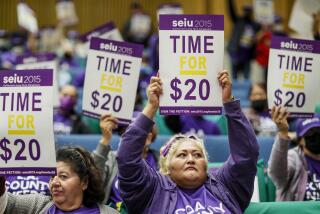Agreement may unravel on wage hike ending Baja farmworkers strike
Violent protests gave way to celebrations last month when the Mexican federal government — in a last-ditch effort to end the Baja California farmworker strike — tentatively agreed to boost wages by footing part of the increased payroll costs.
Thousands of laborers went back to work, the highways to export markets in California — blocked at times by protesters — stayed open, and labor leaders hailed the breakthrough as a rare, potentially historic victory for Mexico’s farmworkers.
But as government, industry and farmworker leaders prepare to meet Thursday to finalize an agreement, the outcome appears far from certain. Agribusiness owners have refused to support the deal publicly, and questions remain as to whether the government is willing or able to follow through on the accord signed May 14.
The strike, which began in mid-March, has at times crippled Baja California’s agricultural economy. The region’s growers are among the biggest in Mexico, supplying berries, tomatoes, cucumbers and other vegetables to leading U.S. retail chains such as Wal-Mart, Safeway and Costco.
If negotiations break down, authorities fear that the region could descend into the kinds of clashes between protesters and police that have resulted in dozens of injuries and left government buildings and police vehicles torched.
The Mexican government, seeking to avoid more violence-filled headlines undercutting its much-touted export sector, may have agreed to subsidize farmworker salaries as a quick-fix solution, labor, industry and economic experts say. Such an arrangement, they say, would be unprecedented in recent Mexican history.
“The government is desperate because the protests were very big and generated great sympathy for the laborers in Mexico and beyond,” said Raul Trejo Delarbre, a researcher at the Autonomous University of Mexico.
The agreement, Trejo and other experts said, is an extreme proposal with significant implications for the Mexican economy. Farm laborers as well as workers in other industries would probably press for similar deals.
Farmworker leaders in San Quintin said they plan to spread the news of their groundbreaking achievements to other regions, including Sinaloa, Mexico’s leading agricultural export state. Officials in Sinaloa have expressed concern about farm labor movements taking root in their region.
A leading business figure in Baja California called the proposal absurd in a recent interview with the Mexican newspaper Milenio. “What if all businesses and all the workers of Mexico asked for subsidies”” said Adrian Olea Mendivil, president of the Baja California Commerce Coordinating Council.
Farmworker leaders have insisted on a daily wage of 200 pesos, about $13. Growers, through their industry trade group, the Agricultural Council of Baja California, haven’t budged from their offer of a 15% wage increase. Average daily wages ranged from $8 to $10 a day and had not been raised for years, according to labor leaders.
The agreement calls for the federal government to negotiate with growers to offer more, and to make up the difference with federal funds, as “close as possible” to the 200-peso daily wage. The vague language — the proposal also does not specify the duration of the subsidies — suggests that the government could walk away from the deal, some experts believe.
The federal government’s representative in the negotiations said in a recent television interview that it is a “possibility” that federal funds would be used to subsidize payrolls, but that much depended on continuing negotiations.
Adding to skepticism about the deal is the ambiguity surrounding the industry’s position. After the tentative agreement was announced, representatives of the agricultural council said they did not sign on to the agreement and reiterated that they would not budge on the salary demands.
Many observers have questioned whether the agricultural council even represents all of the growers in the region. Some of the agribusiness owners are politically powerful, having served in state or federal posts.
Council representatives did not return calls seeking comment.
Twitter: @ricardin24
More to Read
Sign up for Essential California
The most important California stories and recommendations in your inbox every morning.
You may occasionally receive promotional content from the Los Angeles Times.










